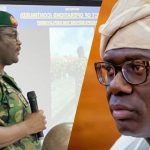A lecturer with the Department of Political Science, Kaduna State University, KASU, Dr. Joshua Danjuma, has stressed the need to encourage peace education for the peaceful co-existence of groups in Kaduna State.
The University don believes the fanatical tendencies in many youths can be eliminated if peace education is encouraged.
Speaking as a guest at the Kaduna youth peace summit organized by the Nigerian Youth Congress, Kaduna State chapter with the theme, “Sustaining Dialogue as a Mechanism of Restoring Peace”, the lecturer said adherents of the various religions and tribal groups should understand that there are similarities among the tribes and religions and dialogue cannot lead to syncretism.
According to him, “Dialogue should be appreciated by all citizens of the state – young, literate and illiterate, the poor and the rich, Christians and Muslims, and traditionalists.”
He noted that retaliation, bigotry, fire brigade approach, compromise, wrong perception of other people’s religions or faith as well as the literacy level of religious adherents could be factors militating against the use of dialogue in resolving conflict.
He explained that the best pathway to successful dialogue is by engaging the right stakeholders in society, such as civil society organizations, professional association, leaders, political parties, among others.
“The leadership of the various ethnic and religious groups in the state should also educate their followers on the need for peace and co-existence, before initiating dialogue so that the groups involved will be ready to forego their grievances in the interest of harmonious living and peaceful co-existence in Nigeria,” he observed.
He noted that the use of force such as the military and the police in managing conflict in Nigeria and Kaduna State, in particular, has not helped matters, saying, “Dialogue seems to be the only mechanism that can help in understanding our people, their drive, needs, and expectations. In this sense, it constitutes a viable mechanism for conflict resolution.”
Dr. Danjuma stated that the goal of dialogue is to develop joint approaches to conflict resolution, as well as improve relationships, understanding, and trust between individuals or groups in conflict with one another.
According to him, dialogue processes bring together actors from across the conflict divide (Christians and Moslems) to develop an improved understanding of the concerns, interests, and needs of the other side.
Earlier, the Nigerian Youth Congress, Kaduna chapter chairman, Zaharaddeen Aminu Tafida lamented that the state is being divided by religious lines, stressing that necessary steps by the youths must be taken to ensure confidence in the minds of the people especially the youths in order to live as an entity.
He admitted that the state is truly diverse, adding that at the level of the youths, they would use the diversity as a source of strength in the state.
He believed that the state has the human and natural resources to develop itself and compete favourably with any other state in the country towards realising sustainable peace, unity and development.





